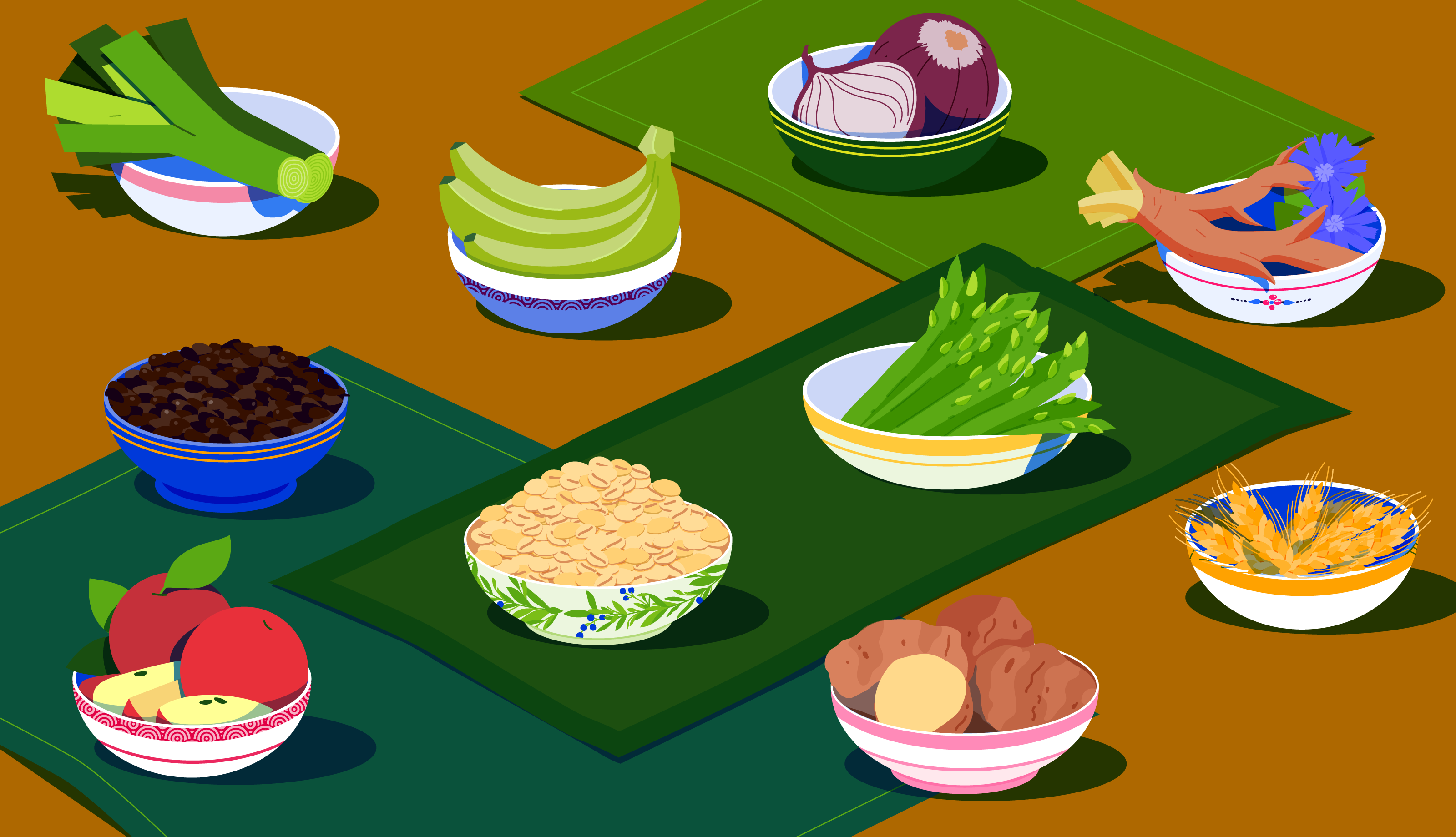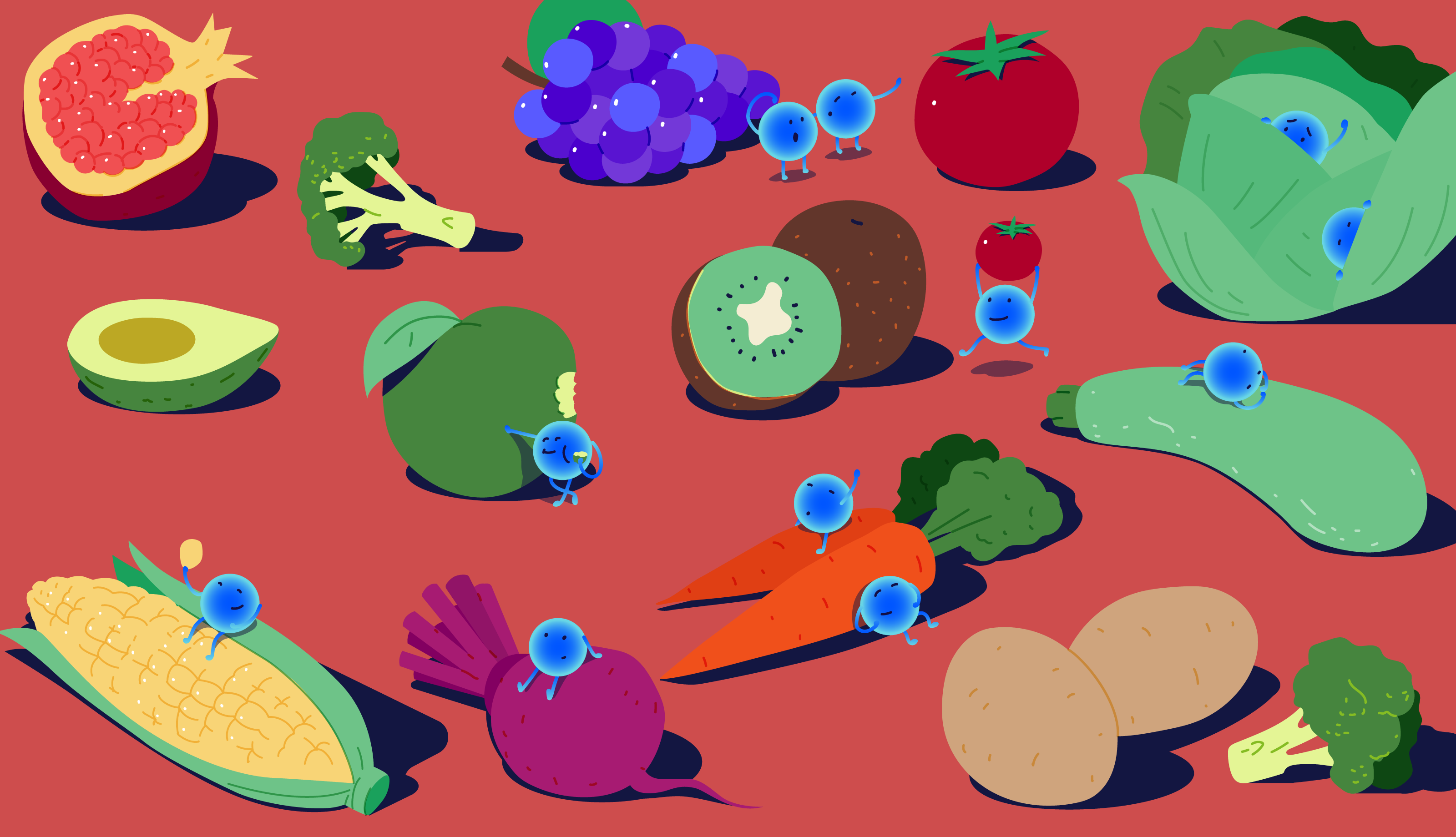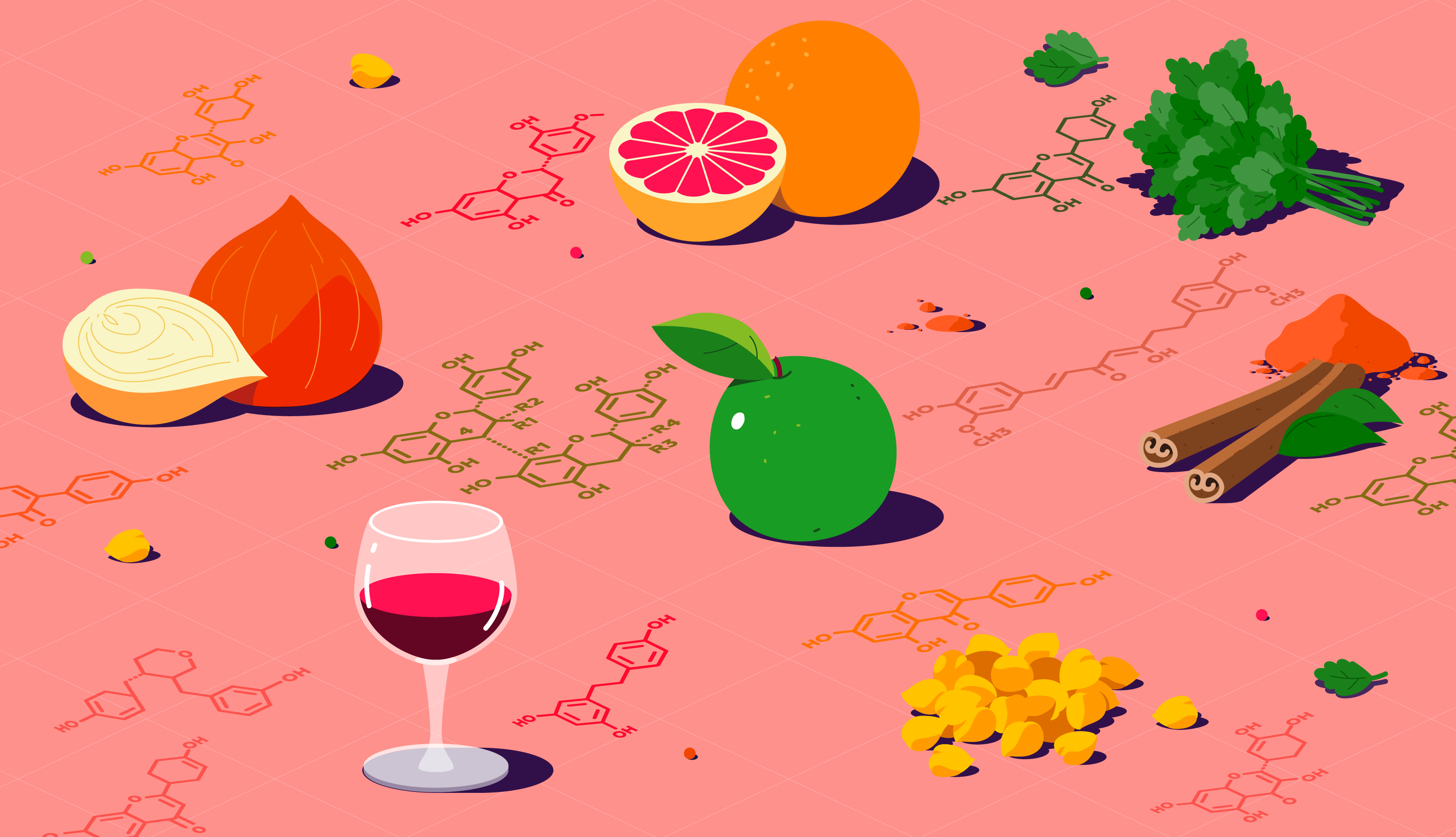Achieve microbiome health this year with superfoods to nourish, sustain, and grow good gut bacteria while enhancing digestion.
Inside your gut, there are trillions of microorganisms. It’s called the gut microbiome (or microbiota), and it’s mostly made up of microbes. This symbiotic relationship has important roles for your health: you provide a home for these bacteria and they return the favour with health-promoting functions.
But to do this, they need to be well-fed with prebiotics: foods that specifically nourish gut microbes. Most prebiotics are plant foods like fruits, vegetables, nuts, and grains that contain dietary fibres and other beneficial compounds, like polyphenols: your gut bacteria break them down into good stuff like short-chain fatty acids (SCFAs) and vitamins.
Types of superfoods
- Apples, the world’s most popular fruit
- Oats, they’re not just for horses
- Asparagus, the pungent vegetable
- Oat bran for your bowel movements
- Chicory root, the coffee substitute
- Green plantain, the savoury banana
- Flaxseed, a seedy superfood
- Jerusalem artichoke, a delicious weed
- Leeks, they’re not just for the Welsh
- Rye, the poor man’s wheat
- Onions, totally worth crying about
- Remember this about all superfoods
Not all superfoods are easy to get your hands on. Fortunately, these 11 superfoods are quite easy to find and cheap to buy. We’ve created this superfood list from the science-backed foods most recommended to Atlas Microbiome Test users to strengthen their gut microbiota superpowers.
From apples to flaxseed, via Jerusalem artichokes and rye, here are the superfoods that can benefit your gut microbiota, why they’re special, and how to prepare them so they lavish your taste buds in pleasure too.
☝TIP☝Although almost all prebiotics are dietary fibres, not all dietary fibres are prebiotic. You should always bear that in mind.
Apples, the world’s most popular fruit
An apple a day won’t necessarily keep the doctor away, but this fruit still has health properties to boost your gut microbiota. This international fruit comes in a variety of vibrant colours that can taste tart, sweet, and lip-puckeringly sour.
The great thing about this fruit is that it is versatile. It can be eaten just as it is or as part of a meal – they’re even used to prepare apple cider vinegar, a fermented condiment. Apples are a desert favourite in the Western diet, but they’re also great in other ways too, like cabbage and apple sauerkraut for an autumnal twist on this typical fermented cabbage dish.
Oats, they’re not just for horses
Often synonymous with the Scots, these grains come from humble beginnings. In fact, the Romans believed them to be a diseased version of wheat. Now we know that oats are a source of beta-glucan, a prebiotic dietary fibre which is fermented by the bacteria in your gut.
Oats are full of soluble fibre, the type that dissolves in water to produce a thick gel which passes slowly through your body, keeping you fuller for longer. The beta-glucan in oats helps lower cholesterol and, in the gut, its prebiotic qualities promote the growth and activity of your intestinal bacteria.
Oats have been a staple of many cultures for over 3000 years because they keep so well. In addition to porridge (arguably the most popular oat-based dish across the world), oats are also added to stuffing and Scotland’s famous offal dish, haggis, but they work well in oatcakes, smoothies, and bread too.
Asparagus, the pungent vegetable
Asparagus naturally contains inulin, a type of prebiotic fibre typically broken down by Eubacterium and Faecalibacterium in your gut. Mouse studies have shown that inulin can also increase the abundance of another beneficial microbe, Akkermansia muciniphila, often found in lean individuals.
Typically boiled, roasted, grilled, or steamed, asparagus is paired with many dishes. Some enjoy it with poached eggs, in pasta dishes, or wrapped in prosciutto. It is a popular vegetable in British, French, and Italian cuisines.
☝FACT☝Asparagus is a diuretic (to increase urine excretion) and had been used as a medicinal plant for thousands of years.
Oat bran for your bowel movements
Oat bran is the outer layer of the grain. It contains a lot of fiber and can absorb a lot of water, which can help ease the passage of digested food through your innards. You probably wouldn’t eat oat bran on its own (it’s flavourless), but you can add it to other dishes to boost the fiber content.
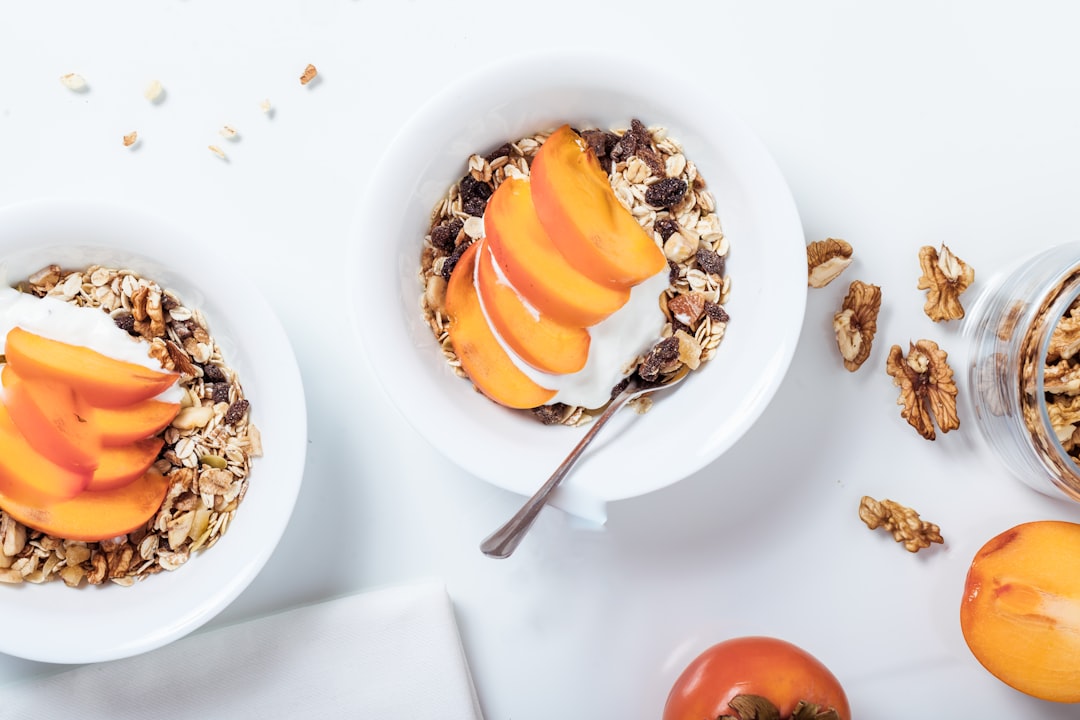
Like whole oats, oat bran is packed with beta-glucan, a prebiotic fibre. In addition to its benefits for your gut microbiota, this fibre has positive effects on metabolic health because it can reduce levels of bad (LDL) cholesterol in the blood, increase levels of good (HDL) cholesterol, improve blood sugar levels, and lower blood pressure.
It’s easy to add oat bran to your diet - add it to your smoothies and soups, bread dough, or muffin mixes. You can also cook it with a hot liquid (water, milk, or broth) to make sweet and savoury fibre-rich porridges that accommodate honey and cinnamon, as well as meat and veg.
Chicory root, the coffee substitute
Chicory root is often sold as a caffeine-free coffee substitute after it has been roasted and ground. It’s a rich source of prebiotic fibre, mainly inulin, that has been highly regarded for its flavour and ability to nourish gut bacteria while preventing constipation.
Whole chicory root can be boiled and eaten as a vegetable, but it’s hard to find. Luckily, you can quite easily get your hands on a chicory root coffee substitute, and it even goes well with milk. All you have to do is stir it into boiling water like you do instant coffee.
☝FACT☝Polyphenols also nourish your gut bacteria and promote the growth of Bifidobacterium, Lactobacillus, and Akkermansia muciniphila.
Green plantain, the savoury banana
Plantains are large, green cooking bananas, but they’re not so sweet and are usually cooked before eaten. This starchy fruit is especially common in Caribbean, African, and Central and Southern American dishes.
Green plantains and unripe bananas are rich in prebiotic resistant starch that feed the butyrate-producing bacteria in your gut. They break down the starch that your body can’t deal with and turn it into beneficial short-chain fatty acids that combat inflammation and maintain your gut lining.
Green plantains are very versatile and can be simmered in spicy soups and stews, but also mashed, roasted, or fried. Thanks to their strong structure, these cooking bananas keep their shape so they can be prepared and presented in many different ways.
Flaxseed: a seedy superfood
Flax was originally used by ancient Egyptians to make linen, but it’s edible seeds are also a valuable addition to your diet. These seeds have a tough hull, so they should be soaked before consuming them. Buying ground flaxseeds can speed up this process.
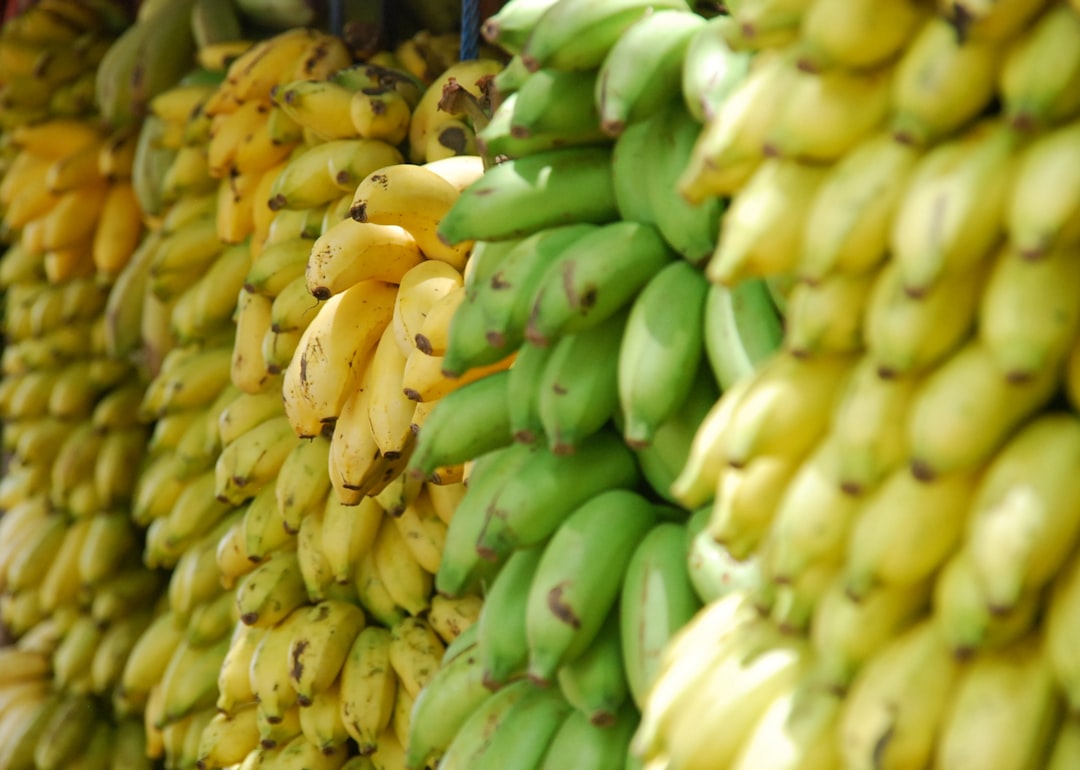
Flaxseeds enhance the integrity of the gut barrier by promoting the production of mucus. Furthermore, studies involving mice suggest that flaxseeds reduce gut inflammation and protect against colon cancer. Plus, they contain two types of fibre: soluble and insoluble. The insoluble form helps to bulk out stools, promoting regular bowel movements and preventing constipation.
Ground, soaked flaxseeds, like oatbran, can be added to yoghurt, cereal, porridge, cakes, breads, and smoothies. You can even make a cheap version of chia seed pudding using these affordable seeds instead.
Jerusalem artichoke, a delicious weed
These little beauties are sometimes known as fartichokes due to their high inulin content that can make humans particularly gassy. Their name is a little deceiving because they have nothing to do with Jerusalem. In fact, they originated in a completely different place: North America.
Your gut microbes love inulin to snack on, but go easy on the Jerusalem artichokes. Too much and you’ll have a roiling belly ache from the gas produced during digestion. However, these edible roots are important because they nourish probiotic Bifidobacteria and Lactobacillus, and they also contain other prebiotic fibres: fructo- and galacto-oligosaccharides (FOS and GOS).
Jerusalem artichokes look like a cross between knobby ginger roots and potatoes that you can roast, boil, steam, sautée, purée, and bake. They are seasonal and can be found in supermarkets and farmer’s markets in autumn and winter.
Leeks, not just for the Welsh
The leek is the national emblem of Wales, but it’s not just the Welsh that love them, your gut bacteria do too. From the same family as the onion and garlic, the leek has been popular throughout Europe, but can actually be traced back to the Middle East and ancient Egypt.
If you don’t like leeks, then you haven’t been eating them right. Try leek and potato soup to warm you up this winter, and remember, if you cool the potatoes first, it’ll be even more prebiotic thanks to the resistant starches.
Rye, the poor man’s wheat
Rye is a hardy grain that has more fibre than wheat. It’s most popular in Scandinavian and East European dark breads and crispbreads. It has less gluten, which results in a tighter bread with rich, nutty, and warming flavours.
Rye is packed with the prebiotic fibre called beta-glucan (just like oats), but also fructan and arabinoxylan. Research shows that fructan increases the gut abundance of Bifidobacteria, a probiotic microbe that supports your gut environment and other beneficial microbes by producing health-promoting substances like SCFAs, antimicrobial defences, and vitamins.
Rather than removing bread completely from your diet, try traditionally-fermented rye sourdough as an alternative to refined white flour “wonder bread” from the supermarket. Open-face crispbreads can also make an excellent work lunch alternative to your usual sandwich.
Onions, totally worth crying about
Onions are pungent bulbs and relatives of leeks and garlic. Not everyone is a fan of onions (because they burn your eyeballs like no other plant, except chilis), but the pain is worth it if you want to strengthen your gut microbiota.
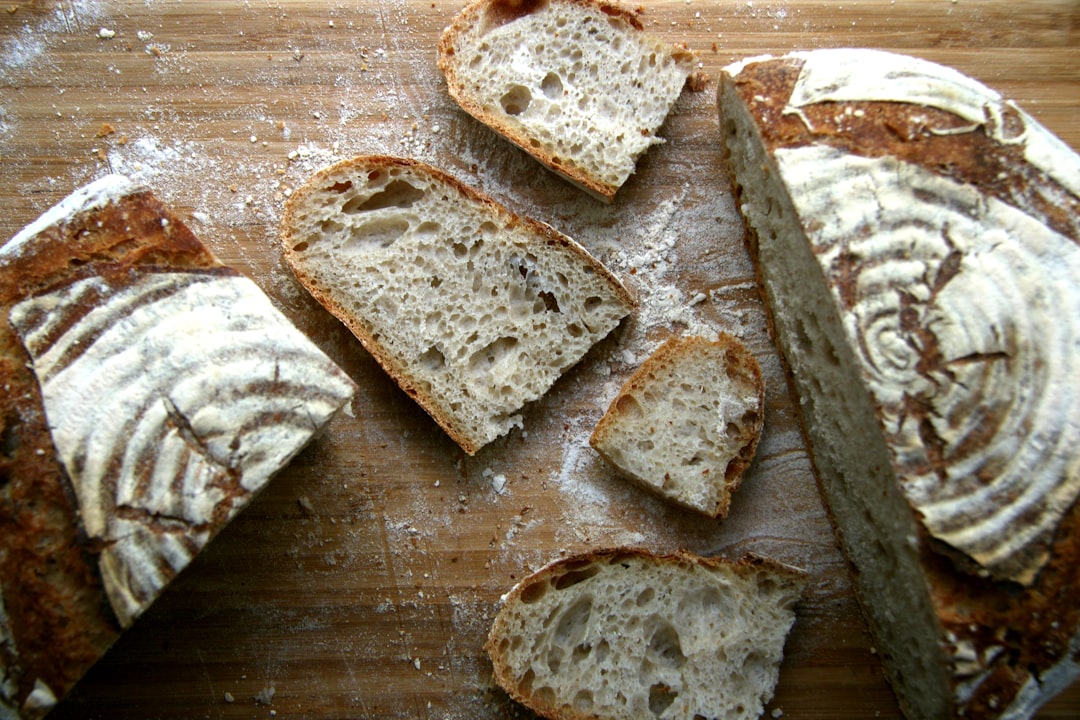
When it comes to your gut, onions are an important source of prebiotics that fuel the activities of your gut bacteria, like inulin (that we’ve discussed amply above) and fructo-oligosaccharides (FOS) that help boost immune health and protect from ill health.
Onions are an essential base ingredient in many cuisines around the world. Whether you’re making soup, stew, or curry, cooked onions provide a delicious and discreet sweetness that deepens the flavour of any dish. Want to eat them raw? Steep them in vinegar for a few hours to make them less potent.
Remember this about all superfoods
Not all superfoods will leave you in debt and desperately seeking purveyors of exotic ingredients online. This list of 11 superfoods is made up of affordable foods that have scientifically verified health attributes for your gut, microbes, and health.
Types of superfoods
| Superfood | Type of fibre |
|---|---|
| Apples | Pectin |
| Oats | Beta-glucan |
| Asparagus | Inulin |
| Oat bran | Beta-glucan |
| Chicory root | Inulin |
| Green banana/plantain | Resistant starch |
| Flaxseed | Soluble and insoluble |
| Jerusalem artichoke | Inulin |
| Leek | Inulin |
| Rye | Text |
| Onions | Inulin |
Even more importantly, these foods are derived from the analysis of microbiome data by the Atlas research team, who has found that these are the most commonly recommended foods for people who have taken the test, meaning that the average person can probably benefit from them too.
The prebiotic properties of these superfoods can nourish your health-promoting gut bacteria, who return the favour by transforming them into beneficial substances which support your microbiome health, thus making them superfoods.
☝Get a microbiome health check☝Find out if you’re getting enough prebiotics with the Atlas Microbiome Test.
- Bianchini, F and Vainio, H. Allium Vegetables and Organosulfur Compounds: Do They Help Prevent Cancer?, 2001
- Boyer, J and Liu, R, H. Apple Phytochemicals and Their Health Benefits, 2004
- Catry, E et al. Targeting the Gut Microbiota with Inulin-Type Fructans: Preclinical Demonstration of a Novel Approach in the Management of Endothelial Dysfunction, 2018
- Daou, C and Zhang, H. Oat Beta-Glucan: Its Role in Health Promotion and Prevention of Diseases, 2012
- El Khoury, D et al. Beta Glucan: Health Benefits in Obesity and Metabolic Syndrome, 2012
- Gibson, G, R. Dietary Modulation of the Human Gut Microflora Using Prebiotics, 1998
- Juskiewicz, J et al. Effect of the Dietary Polyphenolic Fraction of Chicory Root, Peel, Seed and Leaf Extracts on Caecal Fermentation and Blood Parameters in Rats Fed Diets Containing Prebiotic Fructans, 2011
- Kumar, V, P et al. Structural Analyses and Immunomodulatory Properties of Fructo-Oligosaccharides from Onion (Allium cepa), 2015
- Larsen, N et al. Potential of Pectins to Beneficially Modulate the Gut Microbiota Depends on Their Structural Properties, 2019
- Licht, T, R. Effects of Apples and Specific Apple Components in the Cecal Environment of Conventional Rats: Role of Apple Pectin, 2010
- Maier, T, V et al. Impact of Dietary Resistant Starch on the Human Gut Microbiome, Metaproteme, and Metabolome, 2017
- Montefusco, A et al. Antioxidants in Varieties of Chicory (Cichorium intybus L.) and Wild Poppy (Papaver rhoeas L.) of Southern Italy, 2015
- Power, K, A et al. Dietary Flaxseed Modulates the Colonic Microenvironment in Healthy C57B1/6 Male Mice Which May Alter Susceptibility to Gut-Associated Diseases, 2015
- Rakha, A. Characterisation of Dietary Fibre in Cereal Grains and Products, 2011
- Whelan, K et al. Fructan Content of Commonly Consumed Wheat, Rye and Gluten-Free Breads, 2011

